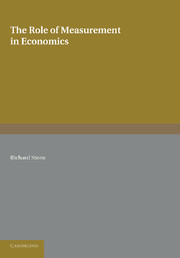III - Four Types of Question in Economics
from INTRODUCTION
Published online by Cambridge University Press: 05 June 2016
Summary
With this somewhat lengthy introduction I shall now set out briefly the way I propose to treat the role of measurement in economics in these lectures. I shall divide the questions which have to be answered, in attempting to obtain and apply economic knowledge, into four classes. The first class comprises questions of fact, and includes empirical constructs such as the income of an individual or a nation and the level of retail prices. The second comprises questions of the truth or falsity of an hypothesis or theory such as whether or not the relationship of preference is transitive or whether or not the Keynesian theory is able to account for certain observed events. The third comprises questions of the estimation of parameters. This will in many cases mean the estimation of the extent to which a change in one variable affects another, for example the extent to which a change in the price of beer will, other things being equal, affect consumption. The final class comprises questions of prediction. These may be of a conditional nature, such as the question: What will be the level of the national income next year given the level next year of asset formation and government expenditure? or unconditional, such as the question: What will be the price of bricks in five years' time?
- Type
- Chapter
- Information
- The Role of Measurement in Economics , pp. 7 - 8Publisher: Cambridge University PressPrint publication year: 2013



